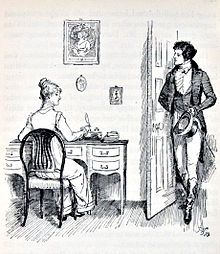Author's note: The following review is originally published in Spanish language on my Hive blog. It may contain spoilers.

Elizabeth and Mr. Darcy. Source: Wikipedia
It is a truth universally acknowledged, that a single man in possession of a good fortune, must be in want of a wife (chapter 1, p. 37).
With this small but proverbial quote, Jane Austen introduces us to Pride and Prejudice's universe, iconic book that, under the form of social satire, reflects the situations that late 18th and early 19th century single women go through when they come into marriageable age (aproximately at 16, 17 years old).
With diverse, charismatic and, in some cases, a little nasty characters, the story that Austen exposes through her pages shows us how sometimes is essential to mature, to be tolerant, and be more discreet at the moment to express disagreements or our dislike towards a person's attitude.
We can find examples of such process of maturing and tolerance exactly in the main characters, Elizabeth "Lizzy" Bennet and Fitzwilliam Darcy. Both met in Meryton, during a public ball. Darcy was a man of distinction and elegance, which make him being so distinguished among the rest of the guests; his attractive was such that he became popular among the ladies. However, such popularity was short-lived; inmediately he proved to be an arrogant and proud man. Both defects made Lizzy to see him as an undesireable man, specially when he declared that Elizabeth "wasn't handsome enough to tempt him" (p. 45).
The mutual opinion that have about each other soon began to change when they began to interact more. In Elizabeth's case, her opinions on Darcy got spontaneously worst when she met his #dear friend", George Wickham, who shows (too much) pleasant before everyone. It let him to do some light hearted statements abouyt Darcy, to the point to state that
Most of (Darcy's) actions were results of his pride, and such pride was his best friend (chapter XVI, p. 110)
Afterwards, during her visit to Derbyshire, Elizabeth begins to notice a big change in Darcy's behavior, due to her rejection of his categorical marriage proposal with these overwhelming words:
From the very beginning—from the first moment, I may almost say—of my acquaintance with you, your manners, impressing me with the fullest belief of your arrogance, your conceit, and your selfish disdain of the feelings of others, were such as to form the groundwork of disapprobation on which succeeding events have built so immovable a dislike; and I had not known you a month before I felt that you were the last man in the world whom I could ever be prevailed on to marry (chapter XXXIV, p. 210).
It was such words, the way in which Elizabeth told him, the liveliness and the fervour and such lady that Darcy realised that, if he wanted to earn her respect and her affection, he must mature. And it was such maturity that Elizabeth, after reading a letterabout Wickham from Darcy, she began to see him in other light.
These characters' evolution was what I loved the most from the book; it was so precise, so sublime that I ended to understand why, at this time, Fitwilliam Darcy is the ideal man's prototype.
If you are a Literature teacher or you're looking for a way to introduce yourself in the book world, undoubtebly Pride and Prejudice is the ideal beginning to do it.